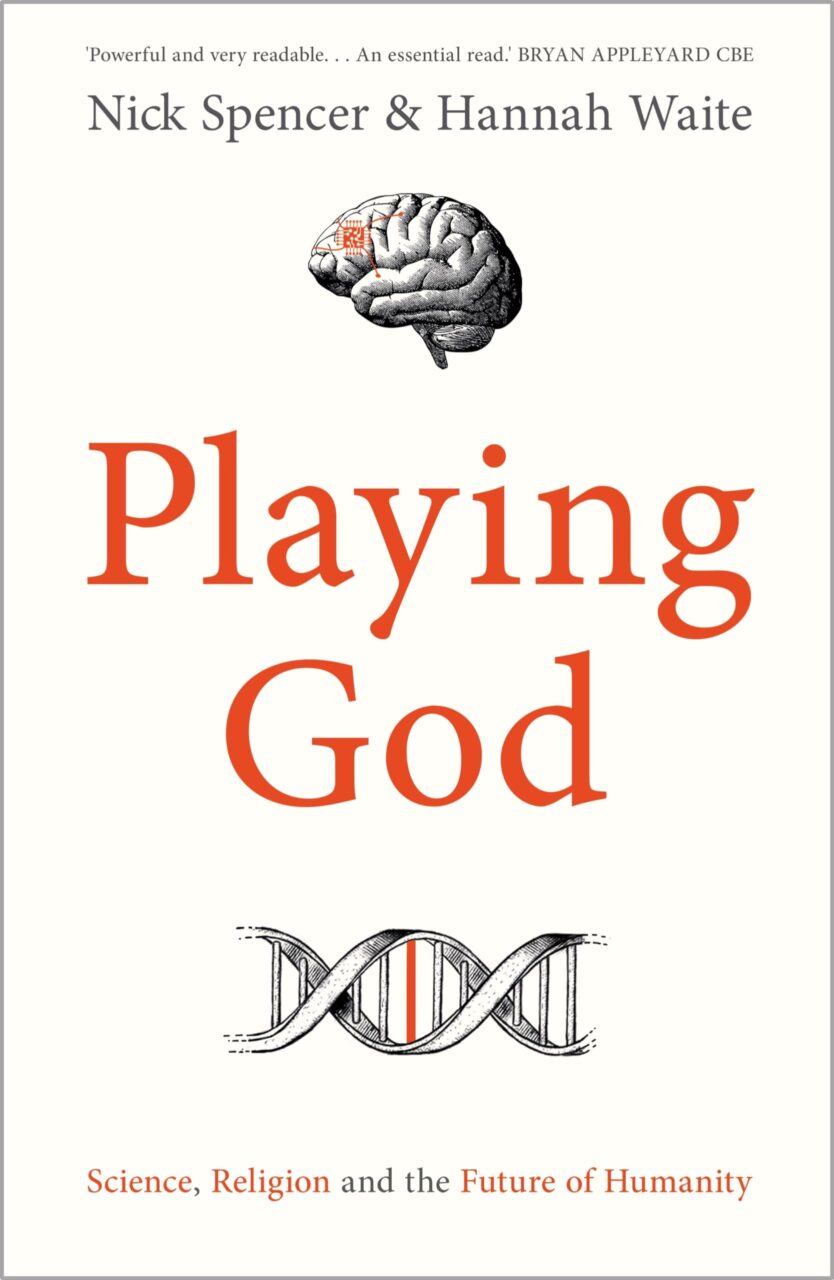Book reviewed by Samuel McKee, November 2024
Playing God: Science, Religion and the Future of Humanity
by Nick Spencer and Hannah Waite
SPCK: London, 2024; 196 pages
ISBN 9780281090037, first edition, hardcover
AUD$40
Nick Spencer has become a valuable voice in the dialogue on science and religion in the past decade where he has produced several strong works on the discipline (see, for example, the ISCAST journal CPOSAT reviews of his other recent work Magisteria: The Entangled Histories of Science and Religion). Hannah Waite has a PhD in divinity at the University of Aberdeen and is now in a postdoc at the University of Leeds where she is continuing to explore intersections of theology and mental health psychology. Her voice in this book is notable across the ethical big questions raised over emerging technology.
The book reviewed here focuses the dialogue on a more practical level on the question of what it means to be human in an increasingly technological future. As science advances in AI, genetic engineering, spacefaring, and other world-changing ventures, what will it mean to be human in that future? And what role will be left for religion to play? Playing God is the best treatment I have read on this matter, and at only 196 pages I highly recommend it to all, regardless of background.
Each chapter is a miniature assessment of a current issue facing humanity arising from the effects of technology, with impressive detail and strong external referencing. Despite its strong academic style, these are all highly accessible for the layperson without a background in the subject. The scope of the issues covered is also impressive, including ventures into the political that many would shy away from. Mental health is covered as well as physical health, with Spencer and Waite drawing from psychology, sociology, theology, and philosophy, intersecting them with each other as well as with the science at focus in each chapter. Waite’s background in psychology and mental health is put to strong use throughout, and this book is another example of the outstanding research that Theos Think Tank routinely produce.
The first chapter deals with the transhumanist quest for immortality. Several high-quality works have addressed this recently (particularly by Sandra Godde) but this is a great summary of the landscape, coupled with a quality theological response in a brief chapter. It sets the tone for the rest of the book that handily grapples with the ultimate question of what it means to be human from each science perspective, only to remind us that “single answers to the ultimate question of what a human is are almost always inadequate” (p. 192).
The chapters proceed through the search for extraterrestrial life, vaccination (and the anti-vaxx movement), human and animal personhood, AI, mental health, abortion, and finally gene editing. Ironically, given the title, “the familiar warning against playing god has no place in these debates” (p. x). The authors instead are concerned with the religious dimension of the scientific and technological conversations. The book contains the appropriate level of restraint and caution, looking to signpost and ask the right questions, rather than bring a specific theological position. There is great strength and wisdom to the restraint shown, and the narrower scope of this shorter book makes it an excellent contribution. Spencer and Waite have a habit of saying more with less words. The referencing is exceptional for those that wish to explore further, and each chapter feels connected by the few, strong threads that tie the theme of the book together. This is all the more remarkable given that there is a useful amount of political research and wrestling in the book. The chapters that are more loaded with ethical questions (especially on vaccination and abortion in the USA) are more concerned with political theology and what is missing, rather than taking a side. The data is heavy and well researched, allowing the reader to make informed assessment of the points made without fear of being undersold.
Throughout the book, I was gladdened by the extent of historical referencing, use of classical philosophy, artistic analogy, and anecdote. The authors are well-informed and draw from their own extensive backgrounds. The work is brief but not dry.
From my own background in genetics and CRISPR-Cas9, I was particularly interested in the chapter on genetic engineering. I was satisfied with how Spencer and Waite framed the chapter in saying “The question is not so much about whether or not we should ‘play God,’ but more what kind of god we should seek to imitate” (p. 171). Genetic engineering is here, and we now live in a CRISPR world. No one is going to put the genetic genie back in the bottle, and Christians must not be the voice shouting against medical and technological progress. What sort of research is ethical and necessary, and where should the lines be rightly drawn? The analysis I was hoping to find was well addressed, including the He Jiankui affair in China, the spacefaring prospects for colonising Mars, and the latest research in military and health benefits.
I found the book to be fair, to adequately summarise each discipline, and to ask the right questions. For a book of less than 200 pages, I see this as an essential contribution to the science–religion dialogue on what it means to be human both now and in the future.

